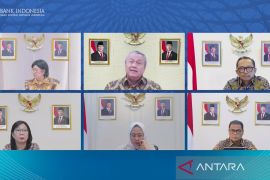The central bank`s governor, Darmin Nasution, said the decision remains consistent with future inflationary pressures, which were believed to be relatively under control.
He said, however, that Bank Indonesia would continue monitoring the risk of inflationary pressures temporarily increasing in the future due to the government's fuel price policy.
"Bank Indonesia would take measures needed to anticipate the impact of short-term inflation," he said.
In that connection, Bank Indonesia would continue strengthening monetary operations and macro-economic prudence by maintaining the consistency of interest rate policies based upon future macro-economic predictions and strengthening the combination of monetary and macro-prudential policy, as well as policy coordination, with the government through the central Inflation Control Team and the Regional Inflation Control Team.
Further, Bank Indonesia`s board of governors viewed the global economy as still being uncertain.
Although the US economy has started showing improvements, economic recovery in Europe is still hindered by the crisis settlement, which is still ongoing in the midst of indications of slowing economic growth in China and India.
Also, slowing global economic growth is expected to affect exports of emerging markets, including Indonesia.
Meanwhile, the relatively low global inflationary pressure has made advanced countries continue implementing accommodative measures, despite a more limited space for it.
The hike in global commodity prices, especially oil, has made inflationary pressure increase and could encourage the implementation of a tight monetary policy in emerging markets.
In view of the uncertainty of the global economic situation and high commodity prices, volatility of foreign capital inflows to emerging markets is expected to continue, he said.(*)
Editor: Heru Purwanto
Copyright © ANTARA 2012






